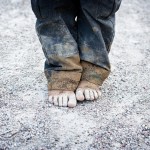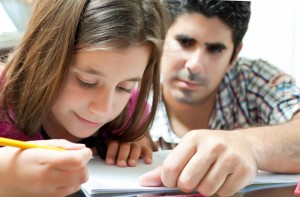
In the current economic climate in many countries across the world, the impact of socio-economic inequalities on mental health has become an important topic, not only in terms of supporting people, but in terms of planning a public health response to a rising concern.
Poverty and low economic status is known to affect various aspects of social life, including education, the distribution of income, health status and health care use. The effects are also reproduced across generations, which can reduce the chances of social mobility.
More is known about the social determinants on adult mental health, but increasing interest in this topic regarding early life has shown that children suffer the consequences of social disparities on their health as well (Currie et al, 2008; Holstein et al 2009).
A recent systematic review has examined the relationships between various indicators of socio-economic status (SES) in children and adolescents up to 18 year of age (Reiss, 2013), seeking to establish the association between low SES and mental health and possible explanations for associations found.
Methods
Reiss’ systematic review looked at 55 studies that included children and young people aged 4 to 18 years. They all met defined inclusion criteria:
- Only published articles from between 1990 and 2011 were included
- Articles had to be published in English or German.
- They contained at least one reported marker of socio-economic status and examined the relationship with one or more mental health problems
- Mental health problems were identified using a validated instrument
Studies that only looked at one group of children e.g. children only from low economic status groups were not included.
Findings
Of the 55 studies that met the inclusion criteria, 52 showed an overall correlation between at least one marker of SES and mental health problems. The studies spanned 23 countries, with the majority having been conducted in North America, Europe and Australia. In the last 5 years the amount of studies in this field has increased, which indicates a growing interest in the subject.
The findings show some important learning that will help us to identify particular children and young people with increased risk of developing mental health problems:

When combined, low parental education and low financial status can have a strong negative impact on the mental health of children
- Whilst low financial status has an impact on children’s mental health, there is a stronger impact where this is coupled with low parental education. These two factors have a greater impact than parental unemployment or low occupational status.
- Children in families receiving welfare benefits are two times more likely to experience mental health problems than the rest of the population.
- Social deprivation was found to have an association with the onset of mental health problems, but no impact on the course or severity of the problems.
- Socio-economic disadvantage was strongly associated with younger children under 12 years old.
- Children from families with a low SES are 3 times more likely to have mental health problems and the odds increase depending on the frequency of exposure.
- Socio-economic disparities were associated with the presence of one or more mental health disorders.
- Poverty can increase the mean number of risk factors for developing mental health problems in children.
- A family history of parental mental illness was a powerful predictor for children’s mental health problems and was a mediating risk factor between low SES and mental health.
Conclusion
Whilst much is already known about risk factors and the development of mental health problems in children (Willie et al, 2008), this evidence shows that when children experience socio-economic disadvantage the odds certainly stack up. Particular attention needs to be paid when children experience low SES over time or are subject to a significant decrease in SES. As well as increasing risks for the individual, there is potential for a strong impact on mental health across future generations, as children are not only affected by socio-economic deprivation, but also by parental mental health issues.

This review adds to the evidence supporting early intervention and prevention programmes to help children and young people at risk of mental illness
Future Public Health interventions should not only focus on the impact of social inequalities on adult health, but on the mental health of children and young people. The findings have a strong indication for the enhancement of early childhood intervention and prevention programmes in order to reduce the potential for an imminent rise in children’s mental health problems, as well as targeted approaches for those experiencing chronic poverty. Of course, a reduction of socio-economic inequalities at a societal level would change the outlook greatly too!
Links
Reiss F (2013) Socioeconomic inequalities and mental health problems in children and adolescents: A systematic review. Social Science and Medicine, 90, 24-31. [PubMed abstract]
Currie C, Gabhainn S, Godeau E, Roberts C, Smith R, and Currie D. (2008). Inequalities in young people’s health: HBSC international report for the 2005/2006 survey (PDF). Copenhagan, WHO Regional Office for Europe.
Holstein B, E., Currie C, Boyce W, Damsgaard T, M., Gobina I and Koekoenyei G. (2009). Socio-economic inequality in multiple health complaints amongst adolescents: international comparative study. International Journal of Public Health, 54 (Suppl. 2), 260-270. [PubMed abstract]
Willie N, Bettge S, Ravens-Sieberer U. (2008). Risk and protective factors for children’s and adolescent’s mental health: Results from the BELLA study. European Child and Adolescent Psychiatry, 17, 133-147.


The cost of living? Early childhood interventions could reduce the impact of socio-economic inequalities on th… http://t.co/ptLPhRPUpZ
Negative impact of socio-economic inequalities on the mental health of children and young people http://t.co/8G6aznygKG
@DrFifiWG summarises a recent SR about socioeconomic inequalities & mental health problems in children & adolescents http://t.co/z4yEOAz9L2
Early childhood interventions may reduce the impact of #mentalhealth inequalities: http://t.co/kH2gMOSQa0 #counselling
Low parental education & low financial status can have a strong negative impact on the mental health of children http://t.co/z4yEOAz9L2
@Mental_Elf @BPSOfficial what about the opposite? pressures to do equally well …
@Mental_Elf So does this mean mental illness is a social rather than medical issue triggered by SES not chemical imbalances?
Social deprivation has an association with mental illness, but no impact on the course or severity of the problems http://t.co/z4yEOAz9L2
RT @Mental_Elf Socio-economic disparities are associated with the presence of one or more mental health disorders http://t.co/UxUgawdo90
Poverty can increase the mean number of risk factors for developing mental health problems in children http://t.co/z4yEOAz9L2
Socio-economic disparities are associated with the presence of one or more mental health disorders http://t.co/z4yEOAz9L2
Children in families living in #poverty are twice as likely to experience #mental health problems as other children http://t.co/4Ryptlz4PN
Don’t miss: Early childhood interventions could reduce impact of socio-economic inequalities on child mental health http://t.co/z4yEOAz9L2
RT @Mental_Elf: Children in families receiving welfare are twice as likely to experience mental health problems as other children http://t.…
Mental Elf: The cost of living? Early childhood interventions could reduce the impact of socio-economic… http://t.co/l5Q45Nu6w6
The cost inequalities on the mental health of children and young people – The Mental Elf http://t.co/4z1XPCDP3w
@Mental_Elf abso-bloody-lutely!!
Early childhood interventions could reduce socio-economic inequalities on #mentalhealth of #children http://t.co/sfPEbrfYjF Via @mental_elf